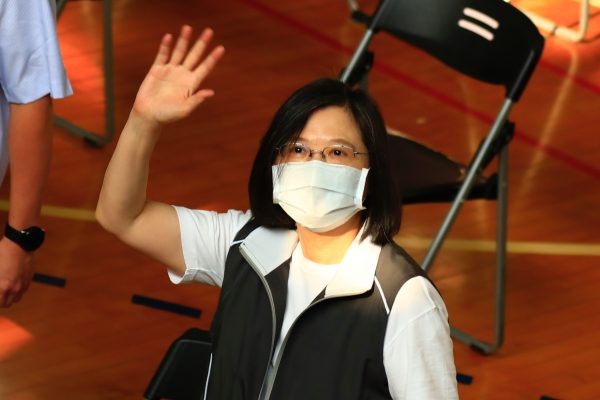Taiwan was remarkably effective in stopping the spread of COVID-19 in 2020, mobilising its Central Epidemic Command Centre as early as 20 January 2020. Taiwan immediately accelerated the production of tests, masks and respirators, closed its borders and launched efficient contact-tracing with coordinated information sharing. Schools and restaurants remained open. With such measures, Taiwan ended 2020 with a mere 799 cases, seven deaths and economic growth of 2.9 per cent.
Taiwan initially continued to maintain control. By 30 April 2021, it had experienced a total of 1128 cases and 12 deaths over 16 months. But in May, the dam burst. Cases reached 8511 by the end of May (with 600 new cases per day at the end of that month) and 14,804 by end of June. Deaths reached 730 by 9 July.
The appearance of new highly transmissible variants triggered the spike. But Taiwan’s readiness had weakened, due to complacency over time and delay in rolling out vaccines. Before the outbreak, the government relaxed its quarantine measures for non-vaccinated airline pilots. A handful of China Airlines pilots were later found to have contracted the virus. From there, it spread through Taiwan’s adult entertainment ‘tea houses’ and eventually to local communities in mid-May.
Taiwan managed to defeat this sudden wave mostly through refocussing on its core methods and continued high levels of social cohesion. Lockdown measures were increased to level three, including a mask-wearing mandate in any public place, a ban on indoor non-essential services, a halt to leisure and religious gatherings, and the use of remote teaching. Contact-tracing and quarantine measures were tightened while foreign nationals were barred from entering the island.
The measures worked. As of 17 September, Taiwan had an average of eight new cases and zero new deaths per day (on a rolling seven-day average), and a very low 35 per million total death rate.
But the May surge highlighted Taiwan’s vulnerability due to late vaccine deployment. As of 15 June, only 0.1 per cent of the population was fully vaccinated and 4 per cent had received one dose. This delay was motivated by the public’s reluctance to take the AstraZeneca vaccine. Only 41 per cent of the public was willing to take vaccines in April, given Taiwan’s full control of the pandemic.
In response to the crisis, Taiwan accelerated the order of Western vaccines. It secured 17 million doses, including 3.4 million doses of from Japan and 2.5 million doses from the United States. But these are insufficient. So, Taiwan had to move to plan B.
In order to acquire larger numbers of Pfizer-BioNTech doses while complying with the firm’s decision to distribute the vaccine through its Shanghai subsidiary, Taiwan has authorised an unusual private-civil society arrangement. Electronic firms Foxconn and TSMC, along with the Tzu-Chi Buddhist foundation, ordered 15 million doses of Pfizer vaccines and 1.84 million doses have been delivered to Taiwan to date. Yet this arrangement has proved controversial, given the complicated state of cross-strait relations — 33 per cent of the public is unwilling to take this vaccine due to its routing through Shanghai.
Meanwhile, Taiwan’s efforts to develop its own vaccine came to the public’s attention. The Medigen vaccine was developed in cooperation with US firm Dynavax. It finished phase two trials in July and was granted Emergency Use Authorisation approval on 19 July. Phase three trials were initiated in Paraguay, a country with diplomatic relations with Taiwan.
This vaccine strategy is proving divisive among the Taiwanese public. Although the Medigen vaccine approval was based on positive responsiveness measured by early antibody counts, it will take more time to ascertain its actual efficacy. Its rapid deployment is becoming a highly political issue, and the opposition doubts its effectiveness and safety. Only 54 per cent of Taiwanese people are willing to take it. The controversy around slow vaccine deployment is now affecting support for the Democratic Progressive Party government.
In the first four weeks of the rollout to 17 September, nearly 721,000 Taiwanese took the vaccine. 13 people died after taking it (possibly due to other causes), but the death rate is extremely low and comparable to other vaccines. In total, only 7 per cent of the population is fully vaccinated to date (and 49 per cent got at least one dose).
Two lessons emerge from Taiwan’s recent experience with COVID-19 — even the best measures get eroded over time by complacency and fatigue, and it is nearly impossible to be safe from COVID-19 without adequate vaccine deployment.
Yves Tiberghien is Professor of Political Science, the Konwakai Chair in Japanese Research and Director Emeritus of the Institute of Asian Research at the University of British Columbia. He is also a Distinguished Fellow at the Asia-Pacific Foundation of Canada. He is the author of the just released The East Asian Paradox (Cambridge University Press 2021).
Jackie Jiaqi Zhao is a Juris Doctor Candidate in the Peter A Allard School of Law at the University of British Columbia.


What a brilliant summary of the Taiwan paradox. I might refer our esteemed leader Jacinda Ardern to it. Our vaccination rate is only 37per cent – and slowing, with over a third of the country in lockdown. Taiwan’s disastrous vaccination rate illustrates why you can never separate politics from public health. All eyes should be on Portugal, with 85 per cent of the total population fully vaccinated. How have they been so successful?
I would like to get the numbers straight. So, from May-2021 to Sep-2021 in Taiwan, the Covid death rate is 35/Million, the Covid vaccine induced death rate is 18/Million comparable to other vaccines. If we extrapolate that outburst to a full year, death rates would be 105/Million for Covid, 35 * 3 as people are continuously exposed, and 18/Million for Covid vaccine, 18*1, as people only take once per year.
To put the number in perspective, in US, influenza has an annual death rate of 18/Million, and pneumonia is 152/Million. Taiwan is doing extremely well.